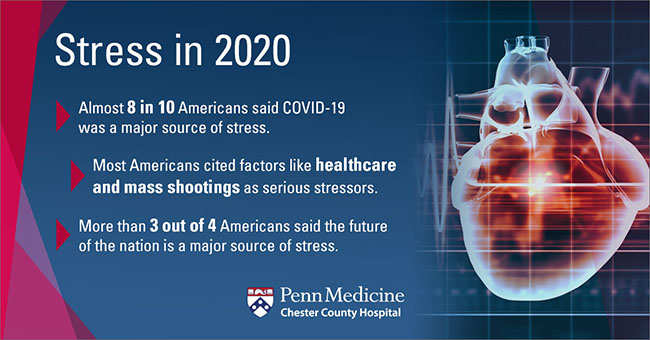
A demanding work schedule, financial woes, a never-ending to-do list, the ongoing pandemic — there are plenty of causes of
stress. Stress can even be a result of positive changes, such as planning a wedding or receiving a promotion.
Stress is inevitable, but too much of it can be bad for your heart health.
February is American Heart Month, a month to focus on your cardiovascular health. While eating healthy, staying active, and getting regular check-ups are all key to maintaining your heart health, managing stress is just as critical.
Unfortunately, stress is all too common in the United States — especially these past few years.

While 2020 and 2021 may have been particularly stressful, any year can cause stress and take a serious toll on your heart health. Here's a look at what stress is, how it affects your heart health, and what you can do about it.
What Is Stress, Anyway?
While you’ve undoubtedly experienced stress at some point in your life, you may not know exactly what it is.
Stress is actually another way your body protects itself. When you sense a threat (real or imagined), your body has an automatic response referred to as "fight-or-flight" or "the stress response".
During this response, your body releases a wave of hormones, including adrenaline and cortisol, that get you ready to take action. These hormones cause physical reactions, such as a quickened heartbeat, higher blood pressure, tightened muscles, and even sharper senses — all preparing you to either fight or run away from perceived danger.
"This stress response can be good for you. It can help you stay focused and alert (such as at work) and it can save your life (such as to avoid a car accident). But too much stress eventually stops being helpful and can end up harming your mood, productivity, relationships, and heart health," explains Abby Ferriola, BSN, RN, PCCN, Practice RN for the Cardiac Surgery/Valve team at Chester County Hospital.
How Does Stress Play a Role in Heart Health?
Your body doesn't discriminate when it comes to stress. Whether stress is good or bad, major or minor, or real or imagined, it can react in similar ways.
Over time, reactions to stress can be damaging to your heart. On its own, stress can strain your heart by:
- Raising your blood pressure
- Increasing cholesterol and triglycerides (a type of fat ) in your blood
- Increasing inflammation
Extreme stress can even cause your heart to beat out of rhythm.
What's more, feeling stressed can lead you to make unhealthy choices to cope, such as:
- Smoking cigarettes
- Drinking too much alcohol
- Eating foods high in sugar, salt, and fat
- Avoiding physical activity
According to Abby, “If you’re already diagnosed with heart disease, stress can be even more of a problem. It can lead to more pain, problems sleeping, and decreased energy for recovery and rehabilitation.”
How to Manage Stress to Improve Heart Health
While stress is a fact of life, there are ways to limit how much stress you experience and manage it in healthy ways when it does happen.
Some ways to manage the level of stress you experience include:
Even with a healthy lifestyle, stress will still happen. In moments of high stress, try to relax by:
-
Practicing yoga, meditation, or mindfulness
- Exercising
- Spending time outdoors
- Getting lost in a book or movie
- Sitting quietly and focusing on your breathing
- Engaging your senses by listening to calm music or petting your dog or cat
The benefits of reducing — and managing — stress goes far beyond improving your heart health. It can improve your mood and reduce physical pain . When you stress less (and manage stress in healthy ways), you can live a happier and healthier life for many years to come.
Do you need help managing the amount of stress in your life? Talk to your Chester County Hospital Primary Care Physician to learn more about limiting stress to improve your heart health.
Related Information from Chester County Hospital: